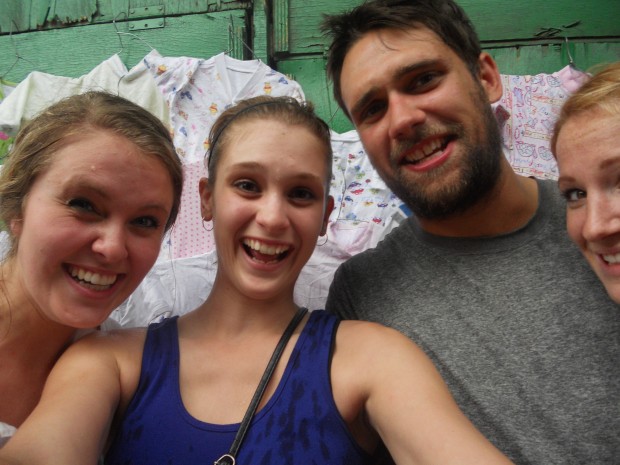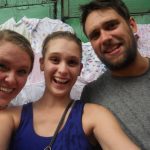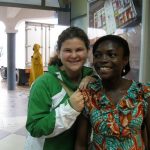
 By: Megan Russell (“Oburoni vs. Kejetia Market Monsoon” to be published in the Public Agenda on 7/29)
By: Megan Russell (“Oburoni vs. Kejetia Market Monsoon” to be published in the Public Agenda on 7/29)
I have come to find that traveling here is a bit difficult. Not only because of the monsoons that frequent the area during this particular season, the endless unpaved, pothole-laden roads, our constant pursuit for a toilet or a suitable substitute, the frigid bucket showers in dark hotel rooms, or the stark differences between the 37 languages… No, on the contrary I would argue that one of the most troubling parts about traveling is the sheer amount of things to see in this country that I simply do not have time to visit. Despite all of the hardships, as we traipse through various villages and cities encountering new sights, sounds and smells with every step we take, I find myself hungry for more. This weekend was no exception.
Prior to my arrival in Ghana my professor had arranged for our study abroad group to make the long, arduous trek up to northern Ghana. We were promised at least one hot shower and perhaps a glimpse of wild African elephants, so we were anxious to depart on this journey. On our way to Mole National Park, our final destination, we stopped in both Kumasi and Tamale.
Over two days we bartered in craft and leather markets, took a tour of the former palace of the Ashanti chiefs, watched workers weave kente cloth tapestries and stamp them with various Ghanaian symbols, traversed through a maze of woodcarvings crafted by skilled artisans, and visited the largest mosque in Ghana. However, the experience that sticks out in my mind the most was our time spent in the central Kejetia Market in Kumasi, which can be accurately described in exactly three adjectives: Terrifying, exhilarating, and really, really wet.
As we were driving through Kumasi one hazy afternoon, our bus topped a small hill and suddenly we were faced with a sprawling valley of tin roofs below us. Masses of people swarmed in and out of the market like busy ants, carrying baskets of dried fish, colorful fabric and other various goods destined for sale or trade in the market. We were directly above Kejetia, the second largest market on the entire African continent.
Descending the hill was comparable to the initial descent of a roller coaster, so much so that I held my breath, which proved useful once the smell of the humid market air hit my nostrils. Our bus came to a complete stand still as people pressed up against its aluminum sides, making driving an impossible feat. All of a sudden the doors opened and we were herded away from the safety of our bus, swept away into the ocean of people. We then put our lives entirely in the hands of Sonny, our Ghanaian tour guide, lifeboat, baby-sitter and good friend.
The sky was dark with smog and impending rain as we obediently followed each other through the masses. Whether it was human nature or simply out of necessity to fit through the crowds our group quickly formed a single file line, our eyes wide as we passed countless huts selling goods ranging from fake hair to dried chameleons.
People yelled as they bartered over commodities, cars honked viciously in the lethargic traffic, and distant speakers pulsated as they blasted unidentifiable Ghanaian hip-hop tunes, making hearing each other a near impossibility. Trotting through the crowd we were pummeled with the pungent smells of dried fish and hot chili peppers. We were even pummeled with grains of rice when three feisty women were angered at the sight of Jake’s camera. He murmured an apology and we trekked on.
We passed the fish market, the fruits and then the vegetables. We conquered the fabric section, the juju magic zone, and narrowly made it through an area where rice barrels overflowed into grates covering the open gutters at our feet, water rushing not so far below. People hurriedly pushed pass us, and mild panic ensued whenever someone broke our oburoni train. The panic quickly turned to grins that plastered our faces as we reveled in the chaos around us.
Suddenly, Sonny came to an abrupt stop and one by one we all ran into the person in front of us. With a menacing smile he announced we were entering the meat market, and told us to stick together.
The smell hit me before my eyes could adjust to the dim lighting. As the dank, humid air filled my nose with the smell of meat, I suddenly became aware of a man walking briskly towards us with a large unidentifiable hunk of meat over his bare shoulder. I jumped out of the way then turned to catch a glimpse and was greeted by a gaping horse head, eyes and teeth still in tact.
We passed countless slabs of ambiguous meat, ranging from goat and sheep to pig and horse. The most surprising part, however, was the men who called this weird, dark environment their workplace. Though we were not adjusted to this type of atmosphere, this was simply a day in their life, a necessity in order to put food on the table at the end of the day. They were laughing and cajoling with one another as they took machetes and butcher knives to lumps and chunks of pink flesh. One man even extended a hand in greeting to Shawna, who reached for it as a reflex then remembered where we were and jerked it back with a grimace just before their hands touched.
We burst into the main market with a collective gasp and sputter, our eyes blinking in the bright exterior. Exchanging nervous smiles and anxiously grasping for each other’s shoulders, we were again swept into the bustling frenzy of the market. It was at that moment that we felt the first drops of rain.
The drops quickly began gaining mass. Huge, dime-sized globules of rain started to plummet from the sky at an alarming rate, so sudden in fact that Sonny broke into a trot, motioning for us to follow. I was following Monica who was directly behind Sonny, and trailing us were Shawna, Jake, and four others. We darted between agitated Ghanaians and leaped over quickly forming ponds of dirty water as we attempted to get closer to the end of the market. Eventually we stopped under a small overhang, catching our breaths and examining our soaked clothing and footwear. However, we quickly realized that we were missing the last four in our group: Michael, Neethu, Michelle and Patrick.
Sonny turned to us, mouthed: “Stay here,” then bounded off into the downpour, leaving our small group with mouths agape and rain dripping into our eyes from our soaked hair. We looked at the rapidly surmounting monsoon, then at each other, and broke out into laughter.
“This WOULD happen to us!” Shawna sputtered, eyes crinkled in laughter as she motioned to her white pants and quickly submerging, once-clean sneakers. Jake pulled out his video camera and began to film our struggle. Monica snapped a picture of all four of us then hurriedly pocketed her camera. The two men under the overhang across from us laughed at the sight of four oburonis caught in a monsoon. They yelled some advice: “You do not have to bathe today now!” followed by voracious laughter and some indecipherable Twi. We all laughed and nodded and said “yes,” hoping that was the response they were looking for.
We rearranged our footing so that we were standing on slightly higher ground than the flooding pathway, eventually calling the life-saving stones our islands as the water rushed through the pathways between the stalls. I halfway expected a giant tsunami wave of muddy water and ambiguous meat chunks to come careening around the corner at any second. Instead came three small children, their school uniforms soaked through and their small feet making waves as they splashed through the river of muddy rainwater.
The ladies in the shack downriver from us yelled to the children and motioned for them to come stand under the same overhang as us. As the downpour relentlessly pounded them with water, they looked at us with big, brown eyes and I smiled and made room for them on my small, semi-dry island. The two small girls gratefully rushed over, but the boy took one look at the situation, weighed his options, decided against trusting four helpless oburonis and took off running down the pathway.
The girls were shy but quietly told me their names (both Elizabeth) when I inquired. Sporting home-sewn yellow school dresses and old black penny-loafers, they clutched the straps of their backpacks and looked at their feet as their white socks turned muddy brown. I asked them their age and about school, but my voice and their replies were barely audible over the torrential rainstorm mercilessly battering the tin roofs overhead. I realized that no words were necessary as the girl closest to me took my hand. I had no idea that such a small gesture could communicate so much.
Every now and then the rain would let up a bit and we’d enthusiastically talk about how the end was near, and then another onslaught would ensue. The river in the pathway was now around 8 cm deep with a mean undercurrent, and my island was rapidly submerging. Despite the grimness of the situation we were all in good humor, laughing and chatting about our bad luck. It carried on as such for seemingly eternity… though in reality it was probably only 20 minutes.
Eventually the skies began to brighten and the rain slowed, apparently two promising events, for the two Elizabeths suddenly darted into the small river, waving goodbye as they bounded down the flooded pathway.
“Sonny knows exactly where we are and is coming back for us at any second,” Monica expertly asserted at that point. Jake looked doubtful. Shawna looked at her ruined sneakers. We all agreed to stay put.
We waited… and waited. Eventually we relocated to the ledge of a small shack selling sunglasses, where a charismatic man told us how much he loved America for 5 minutes. We were kicked off the ledge when he abruptly said goodbye, so we returned to our flooded islands. Our eyes never left the spot where we had last seen Sonny’s characteristic brown argyle fedora hat.
Finally he arrived with our four disheveled yet smiling companions in tow. They informed us they had been shopping during the monsoon. We informed them we had been struggling to stay afloat. We then followed Sonny to the exit, which turned out to be just around the corner/river bend the whole time. Jokes on us, right?
Terrifying, exhilarating, and really, really wet… three adjectives I hope to never string together in a sentence ever again. But all in all, I can honestly say that that was one experience I will never ever forget. As we stood there, soaked to the bone and having no idea as to our location, we still somehow managed to thoroughly enjoy ourselves. We managed to make friends while caught in a monsoon somewhere in the second largest market in Africa. The men across from us, the women downstream, the schoolchildren… for them this was a regular occurrence. They took everything in stride and there were no complaints to be heard. Babies passed by on their mothers backs, blinking as the rain trickled into their eyes and not once uttering a cry or shedding a tear. Once the monsoon was over, everyone was on their way as if nothing had happened. Maybe Americans are too fragile after all.
Kejetia Market, you may have won this time. But I’ll be back soon, this time armed with rain boots, a poncho, an umbrella, and perhaps a small rowboat. Until we meet again…




Comments by jaclynr